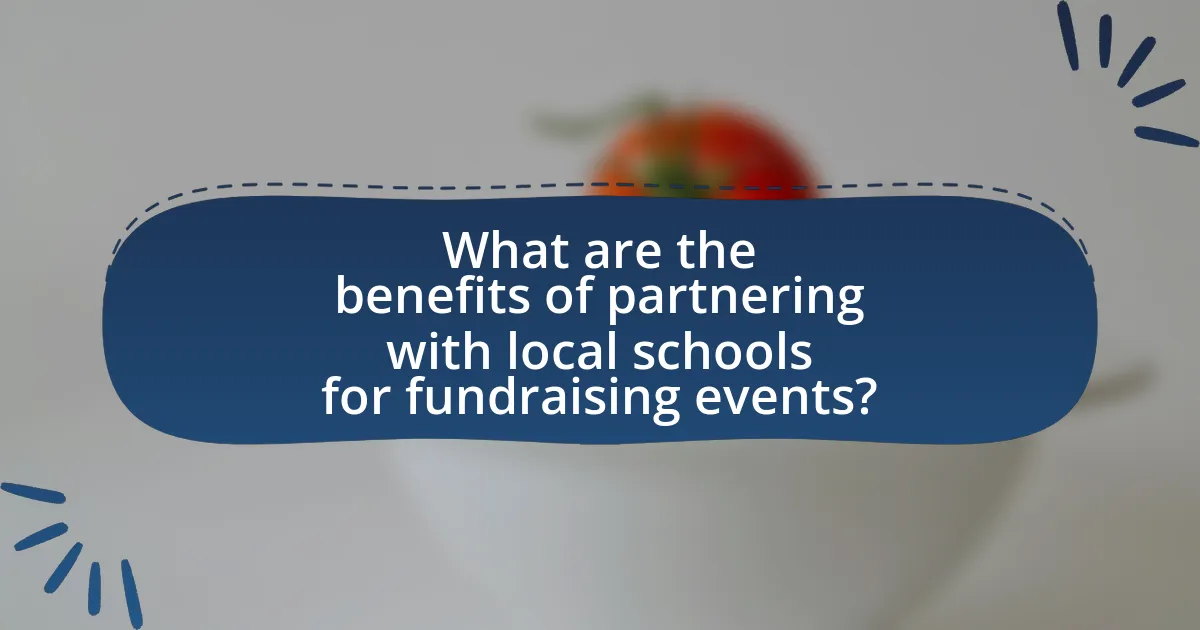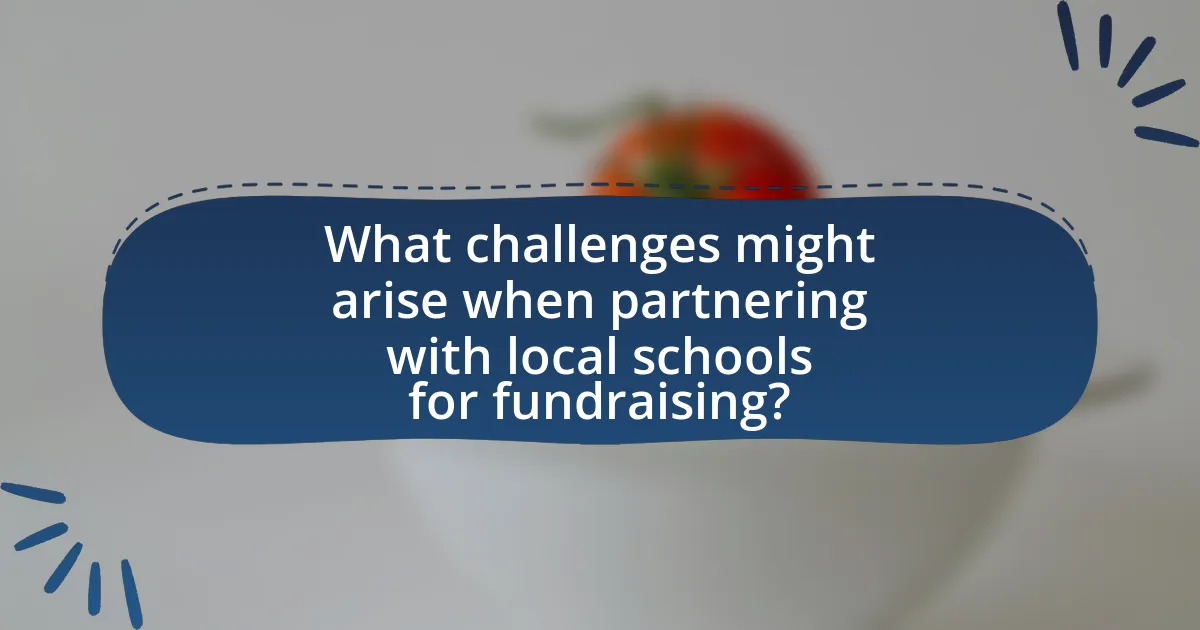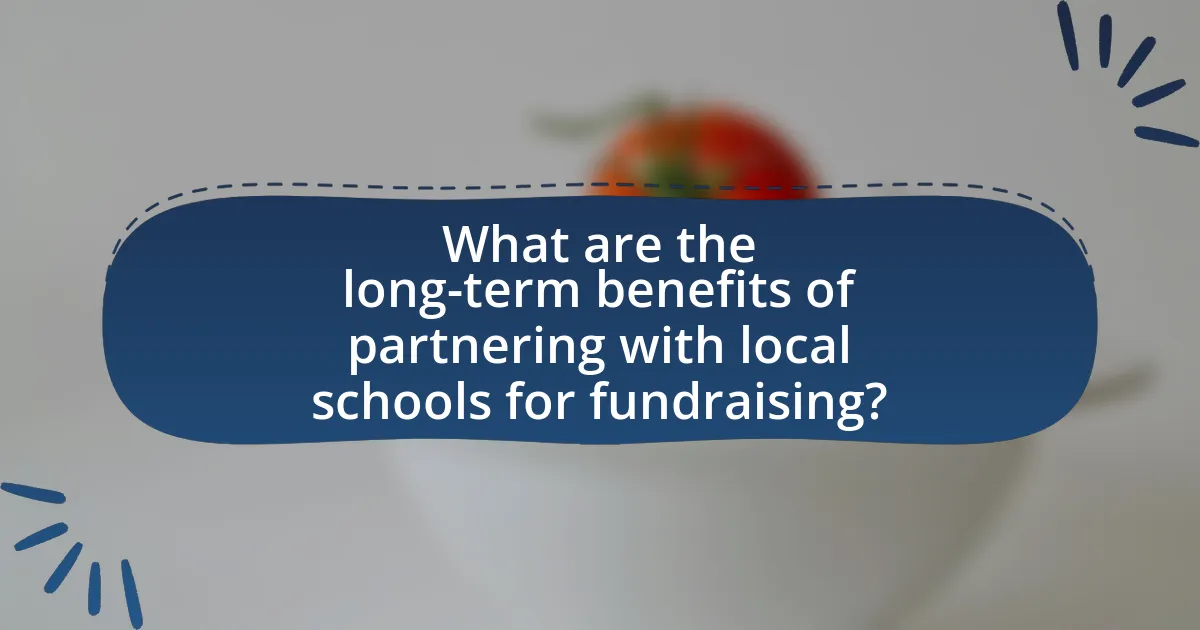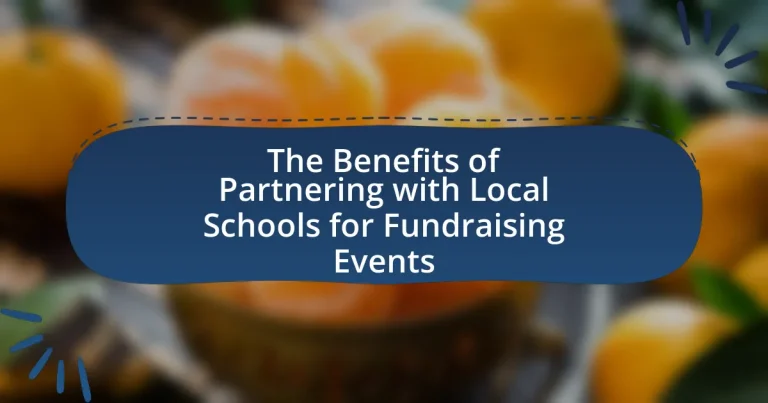The article focuses on the benefits of partnering with local schools for fundraising events, highlighting how such collaborations enhance community engagement and increase fundraising potential. It discusses strategies for schools to enhance their fundraising efforts, the unique resources they provide, and the significant role of parents and teachers in these initiatives. The article also addresses the types of fundraising events that can be organized, the importance of community involvement, and the long-term advantages of establishing strong partnerships with schools. Additionally, it outlines potential challenges and legal considerations, emphasizing best practices for effective collaboration to ensure successful fundraising outcomes.

What are the benefits of partnering with local schools for fundraising events?
Partnering with local schools for fundraising events enhances community engagement and increases fundraising potential. Schools have established networks of students, parents, and faculty, which can significantly boost participation and support for events. For instance, a study by the National Association of Secondary School Principals found that schools that collaborate with local organizations see a 30% increase in event attendance and contributions. This partnership not only fosters a sense of community but also promotes educational initiatives, as funds raised can directly benefit school programs and resources.
How can local schools enhance fundraising efforts?
Local schools can enhance fundraising efforts by leveraging community partnerships and engaging parents and local businesses. By collaborating with local businesses, schools can organize joint events that attract more participants and sponsors, thereby increasing revenue. For instance, schools can host community fairs or charity runs in partnership with local shops, which not only raises funds but also fosters community spirit. Additionally, involving parents through volunteer opportunities and fundraising committees can boost participation and support, as studies show that schools with active parent engagement see a 30% increase in fundraising success.
What unique resources do local schools provide for fundraising?
Local schools provide unique resources for fundraising, including access to student and parent networks, facilities for events, and promotional support through school communications. These resources enhance fundraising efforts by leveraging the community’s involvement and utilizing school venues for activities like bake sales, car washes, or auctions. Additionally, schools often have established relationships with local businesses, which can lead to sponsorship opportunities or donations, further supporting fundraising initiatives.
How do school communities contribute to fundraising success?
School communities significantly contribute to fundraising success by leveraging their collective networks and resources. These communities, which include students, parents, teachers, and local businesses, create a robust support system that enhances outreach and engagement. For instance, a study by the National School Foundation Association found that schools with active parent-teacher organizations raised 30% more funds than those without such involvement. This increased fundraising capability stems from the diverse connections and shared commitment to the school’s mission, which fosters a culture of giving and collaboration.
Why is community involvement important in fundraising?
Community involvement is crucial in fundraising because it enhances engagement and increases the likelihood of financial support. When local communities participate, they create a sense of ownership and connection to the cause, which can lead to higher donation rates. Research indicates that campaigns with strong community ties can raise up to 50% more funds compared to those without local involvement, as seen in various case studies of successful fundraising events. This connection fosters trust and encourages individuals to contribute, knowing their support directly benefits their community.
How does partnering with schools foster community engagement?
Partnering with schools fosters community engagement by creating collaborative opportunities that connect students, families, and local organizations. This collaboration enhances social ties and encourages participation in community events, as schools serve as central hubs for families and community members. Research indicates that schools involved in community partnerships report increased volunteerism and support from local businesses, which strengthens community bonds and promotes a culture of giving. For instance, a study by the National Education Association found that schools with active community partnerships saw a 30% increase in parental involvement, demonstrating the direct impact of such collaborations on community engagement.
What role do parents and teachers play in fundraising initiatives?
Parents and teachers play a crucial role in fundraising initiatives by actively participating in planning, organizing, and executing events that generate financial support for schools. Their involvement ensures that fundraising efforts align with the needs of the school community and fosters a collaborative environment. For instance, research indicates that schools with strong parental involvement in fundraising activities often see increased financial contributions and community engagement, as parents leverage their networks to enhance outreach and support. Additionally, teachers contribute by identifying specific needs within the school, helping to target fundraising efforts effectively, and engaging students in the process, which can lead to higher participation rates.
What types of fundraising events can be organized with local schools?
Local schools can organize various types of fundraising events, including bake sales, car washes, fun runs, and talent shows. Bake sales leverage the community’s baking skills and can generate significant funds through the sale of homemade goods. Car washes provide a hands-on experience for students and can attract local customers, while fun runs promote health and fitness, encouraging participation from families and the community. Talent shows showcase student talents and can charge admission fees, creating an engaging event that fosters school spirit. These events not only raise funds but also strengthen community ties and enhance student involvement.
What are some popular fundraising event ideas for schools?
Popular fundraising event ideas for schools include bake sales, car washes, fun runs, and silent auctions. Bake sales are effective because they engage students and parents, generating community involvement and support. Car washes provide a hands-on experience for students while raising funds through service. Fun runs promote health and fitness, encouraging participation from families and local businesses, often resulting in sponsorships. Silent auctions can attract donations from local businesses, creating an opportunity for schools to raise significant funds while fostering community relationships. These events not only raise money but also strengthen school-community ties.
How can schools and organizations collaborate on event planning?
Schools and organizations can collaborate on event planning by establishing partnerships that leverage each other’s resources and expertise. For instance, schools can provide venues, student volunteers, and community engagement, while organizations can offer funding, promotional support, and professional experience in event management. This collaboration can enhance the reach and impact of fundraising events, as evidenced by successful partnerships like the one between local schools and non-profits, which have raised significant amounts for community projects. Such collaborations not only foster a sense of community but also create valuable learning experiences for students involved in the planning and execution of events.
How can partnerships with local schools be established?
Partnerships with local schools can be established by initiating direct communication with school administrators to discuss mutual goals and interests. Engaging in meetings or workshops allows organizations to present their vision for collaboration, emphasizing shared benefits such as community engagement and educational support. Research indicates that schools often seek partnerships that enhance student learning and provide resources, making it essential to align proposals with the school’s educational objectives. For instance, a study by the National Association of Partners in Education highlights that effective partnerships lead to improved student outcomes and increased community involvement, reinforcing the value of establishing these connections.
What strategies can be used to maintain successful partnerships?
To maintain successful partnerships, clear communication and mutual goals are essential. Establishing regular check-ins and updates fosters transparency and trust between partners. Additionally, aligning objectives ensures that both parties work towards common outcomes, enhancing collaboration. Research indicates that partnerships with defined roles and responsibilities lead to higher satisfaction and effectiveness, as seen in studies by the Stanford Social Innovation Review, which highlight the importance of shared vision in successful collaborations.

What challenges might arise when partnering with local schools for fundraising?
Partnering with local schools for fundraising can present several challenges, including regulatory restrictions, varying levels of engagement from school administration, and potential conflicts with existing school policies. Regulatory restrictions often arise from state or district guidelines that dictate how funds can be raised and allocated, which can limit the types of fundraising activities allowed. Additionally, the level of engagement from school administration can vary significantly; some administrators may be enthusiastic and supportive, while others may be indifferent or resistant, impacting the overall success of the fundraising efforts. Conflicts with existing school policies, such as those related to student participation or the types of products sold, can also hinder fundraising initiatives. These challenges highlight the complexities involved in collaborating with educational institutions for fundraising purposes.
How can organizations address potential challenges in school partnerships?
Organizations can address potential challenges in school partnerships by establishing clear communication channels and setting mutual expectations. Effective communication ensures that both parties understand their roles, responsibilities, and objectives, which minimizes misunderstandings. For instance, regular meetings and updates can help maintain alignment on goals and progress. Additionally, organizations should create formal agreements that outline the partnership’s terms, including timelines, resources, and evaluation metrics. This structured approach has been shown to enhance collaboration and accountability, as evidenced by studies indicating that well-defined agreements lead to more successful partnerships in educational contexts.
What are common obstacles faced during fundraising events?
Common obstacles faced during fundraising events include insufficient planning, lack of participant engagement, and inadequate marketing strategies. Insufficient planning can lead to logistical issues, such as venue availability and resource allocation, which can hinder the event’s success. Lack of participant engagement often results from not effectively communicating the event’s purpose or benefits, leading to low attendance and participation. Inadequate marketing strategies can prevent the event from reaching a wider audience, limiting potential donations. According to a study by the Association of Fundraising Professionals, 30% of fundraising events fail due to poor marketing and outreach efforts, highlighting the importance of addressing these obstacles for successful fundraising initiatives.
How can communication improve partnership outcomes?
Effective communication enhances partnership outcomes by fostering trust, clarity, and collaboration among partners. When partners engage in open dialogue, they can align their goals, share resources, and address challenges more efficiently. Research indicates that organizations with strong communication practices experience a 25% increase in project success rates, as clear communication reduces misunderstandings and promotes a shared vision. Furthermore, regular updates and feedback loops ensure that all parties remain informed and engaged, ultimately leading to more successful fundraising events with local schools.
What legal considerations should be taken into account?
Legal considerations for partnering with local schools for fundraising events include compliance with educational regulations, liability issues, and tax implications. Educational regulations may dictate how funds can be raised and used, ensuring that activities align with school policies. Liability issues arise from potential injuries during events, necessitating waivers or insurance coverage to protect both the school and the partnering organization. Tax implications involve understanding the tax-exempt status of schools and ensuring that fundraising activities do not jeopardize this status, as outlined by the Internal Revenue Service guidelines.
What permissions are needed for fundraising events at schools?
Fundraising events at schools typically require permission from school administration, which includes obtaining approval from the principal or designated school officials. Additionally, depending on the nature of the event, permits may be needed from local government authorities, especially if the event involves public spaces or food sales. Schools often have specific guidelines and forms that must be completed to ensure compliance with district policies and safety regulations. These requirements are in place to ensure that events align with educational goals and maintain a safe environment for students and participants.
How can organizations ensure compliance with school policies?
Organizations can ensure compliance with school policies by establishing clear communication channels with school administrators and regularly reviewing policy guidelines. By engaging in open dialogue, organizations can clarify expectations and align their fundraising activities with school regulations. Additionally, conducting training sessions for staff involved in fundraising can reinforce understanding of these policies. Research indicates that organizations that actively collaborate with schools and seek feedback on their initiatives are more likely to adhere to established guidelines, thus fostering a compliant and supportive fundraising environment.

What are the long-term benefits of partnering with local schools for fundraising?
Partnering with local schools for fundraising provides long-term benefits such as enhanced community engagement and sustained financial support. This collaboration fosters a sense of belonging and loyalty among community members, as schools often serve as central hubs for families. Research indicates that businesses involved in school fundraising can see a 20% increase in customer loyalty, as parents and community members are more likely to support businesses that contribute to local education. Additionally, these partnerships can lead to ongoing relationships that yield repeat fundraising opportunities, creating a reliable revenue stream for both the school and the partnering organization.
How does building relationships with schools impact future fundraising?
Building relationships with schools significantly enhances future fundraising efforts by creating a network of support and trust. When organizations collaborate with schools, they gain access to a dedicated community of parents, teachers, and students who are more likely to contribute to fundraising initiatives. Research indicates that schools with strong community ties can increase fundraising success by up to 30%, as these relationships foster a sense of shared purpose and commitment. Additionally, schools often have established communication channels and events that organizations can leverage, making it easier to reach potential donors and increase participation in fundraising activities.
What are the benefits of establishing a reputation within the community?
Establishing a reputation within the community enhances trust and credibility, which can lead to increased support and collaboration. A strong community reputation encourages local residents to engage with initiatives, such as fundraising events, resulting in higher participation rates and donations. Research indicates that organizations with positive community reputations experience a 20% increase in volunteer involvement and a 15% boost in financial contributions, demonstrating the tangible benefits of community trust.
How can successful events lead to ongoing partnerships?
Successful events can lead to ongoing partnerships by establishing trust and demonstrating mutual benefits between the involved parties. When a fundraising event is executed effectively, it showcases the capabilities and reliability of the partners, fostering a sense of collaboration. For instance, a well-organized event can result in increased visibility and resources for local schools, while businesses gain community goodwill and potential customer engagement. This reciprocal value encourages both parties to continue their relationship, as evidenced by studies showing that organizations that engage in successful collaborations often report higher rates of repeat partnerships.
What best practices should be followed for effective school partnerships?
Effective school partnerships should prioritize clear communication, mutual goals, and active engagement. Establishing open lines of communication ensures that all stakeholders are informed and aligned, which is crucial for successful collaboration. Setting mutual goals allows both the school and partnering organizations to work towards shared objectives, enhancing the partnership’s impact. Active engagement from both parties fosters a sense of ownership and commitment, leading to more successful fundraising events. Research indicates that partnerships with defined roles and responsibilities significantly improve outcomes, as seen in studies conducted by the National Association of Partners in Education, which highlight the importance of structured collaboration in achieving educational and fundraising success.
How can organizations create mutually beneficial fundraising strategies?
Organizations can create mutually beneficial fundraising strategies by collaborating with local schools to leverage shared resources and community engagement. This partnership allows organizations to access a wider audience while schools benefit from additional funding and support for their programs. For instance, a study by the National Association of Secondary School Principals found that schools that engage in community partnerships see a 20% increase in fundraising success. By aligning goals, such as enhancing educational opportunities or promoting community welfare, both parties can maximize their impact and foster long-term relationships that support ongoing fundraising efforts.
What tips can enhance collaboration between schools and organizations?
To enhance collaboration between schools and organizations, establishing clear communication channels is essential. Effective communication fosters mutual understanding of goals, expectations, and resources, which is crucial for successful partnerships. Research indicates that partnerships with defined roles and responsibilities lead to more productive outcomes; for instance, a study by the National Education Association found that schools with strong community partnerships improved student performance by 20%. Additionally, creating joint initiatives that align with both the educational objectives of schools and the mission of organizations can further strengthen collaboration. This alignment ensures that both parties are invested in the success of the partnership, leading to more impactful fundraising events and community engagement.


